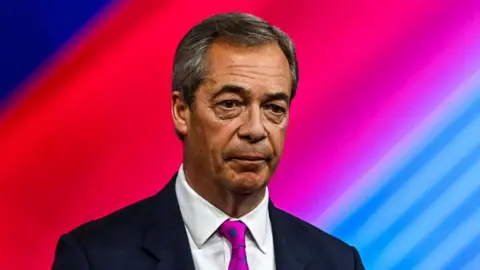Nigel Farage: BBC apologises to Farage over account closure story
 Getty Images
Getty ImagesThe BBC has apologised to Nigel Farage over its inaccurate report about why his account at Coutts bank was closed.
On 4 July, the BBC reported Mr Farage no longer met the financial requirements for Coutts, citing a source familiar with the matter.
The former UKIP leader later obtained a Coutts report which indicated his political views were also considered.
Mr Farage said he accepted the apologies "with good grace", but said questions for Coutts remained.
He thanked BBC News CEO Deborah Turness - who has written to him - and business editor Simon Jack - who has tweeted - for their apologies.
"It's not often that the BBC apologise. But for the BBC to apologise, I'm very, very pleased," Mr Farage said.
Speaking on BBC Radio 4's PM programme, Mr Farage said he had had to publish a lot of material in order to clear up misinformation in the wake of the 4 July story.
"I had to go to very great lengths and great personal damage to undo the story," Mr Farage said.
"There is no fault or no blame on the BBC. This now goes right back to the Natwest Banking Group [owners of Coutts].
"Someone in that group decided it was appropriate, legal and ethical to leak details of my personal financial situation.
"That, I think, is wrong on every level - and that is where the spotlight should be and it will."
Mr Jack, who tweeted his apology, said his story had been "from a trusted and senior source".
"However, the information turned out to be incomplete and inaccurate. Therefore, I would like to apologise to Mr Farage," Mr Jack continued.
Mr Farage later said: "Jack says, in the tweet, that his information came from a trusted and senior source. I would suggest that it may well have been a very senior source."
On 21 July, the BBC updated its original article to say it had "not been accurate". Mr Farage then asked for a formal apology from the BBC.
On Monday, the BBC said on its Corrections and Clarifications website: "We acknowledge that the information we reported - that Coutts' decision on Mr Farage's account did not involve considerations about his political views - turned out not to be accurate and have apologised to Mr Farage."
When Coutts decided to close Mr Farage's account, he said it did not give him a reason.
Mr Farage subsequently obtained a document looking at his suitability as a Coutts customer.
The 40-page document provided to Mr Farage included minutes from a meeting in November last year reviewing his account.
The document flagged concerns that he was "xenophobic and racist", and also raised concerns about the reputational risk of having Mr Farage as a client.
It said that to have Mr Farage as a customer was not consistent with Coutts' "position as an inclusive organisation" given his "publicly stated views".
Mr Farage said the BBC had fallen for "spin" and he had been "cancelled" for his political views.
The boss of NatWest Group, Dame Alison Rose, apologised on Thursday to Mr Farage for what she called the "deeply inappropriate" comments made in the document.
She also said that she was commissioning a full review of Coutts' processes on bank account closures.
Mr Farage has called for Dame Alison to be questioned by MPs.
Speaking on GB News on Monday evening, Mr Farage said he had now submitted a subject access request (a request for a copy of information held about you) to NatWest and had raised his case with the Information Commissioner's Office.
He also disclosed the contents of the letter sent to him on Monday by the BBC's Deborah Turness, in which she apologised, saying: "I can understand why you feel this story has contributed to you being put through a considerable and humiliating amount of publicity."
The Treasury has called a meeting with bank bosses over account closures, following the row between Mr Farage and NatWest.
The BBC will hope its apology will draw a line under the story.
The fallout is an insight into a key tenet of journalism - sourcing stories. Reporters have to be able to trust their sources and it's standard journalistic practice not to reveal who they are.
In this case, that trust broke down.
